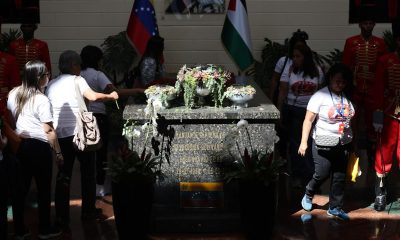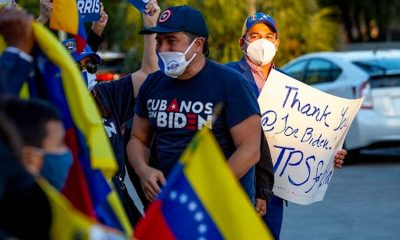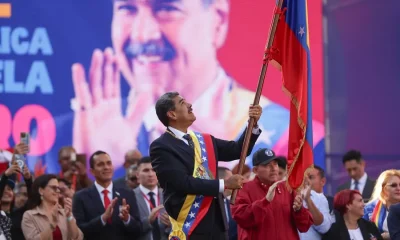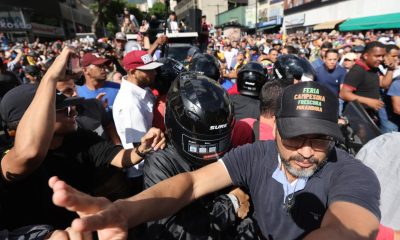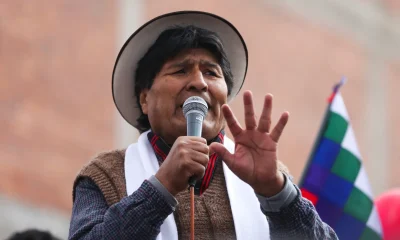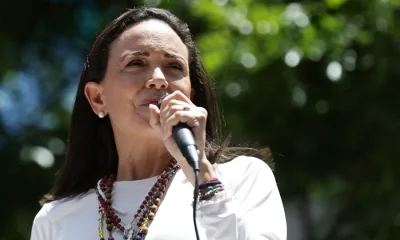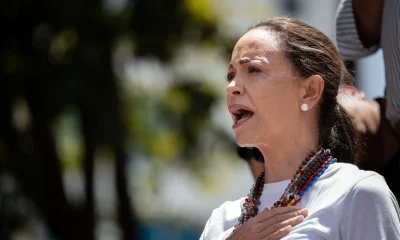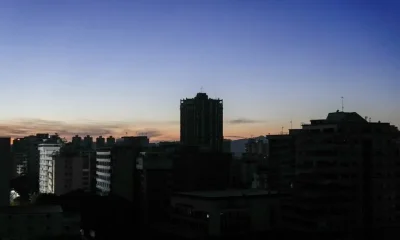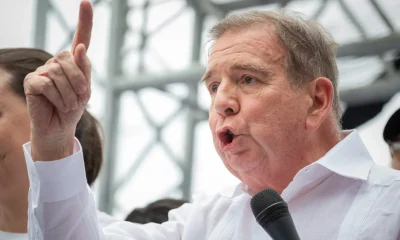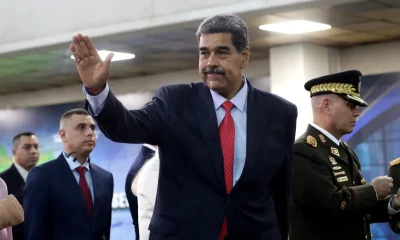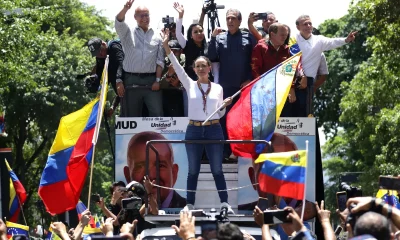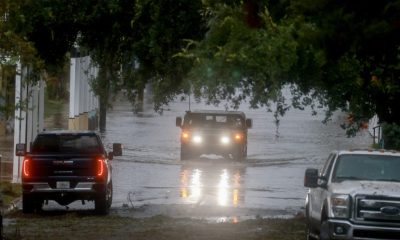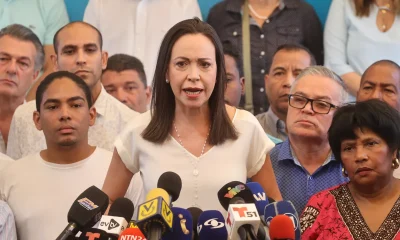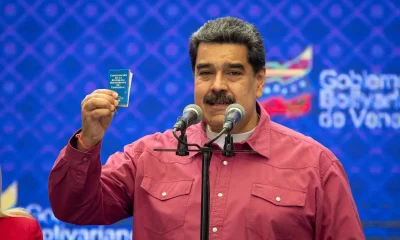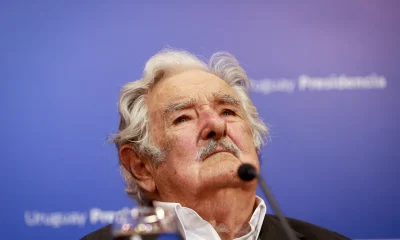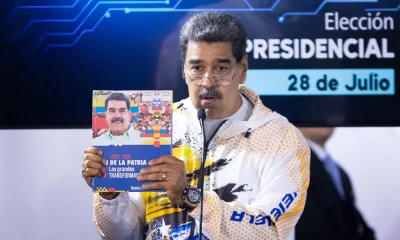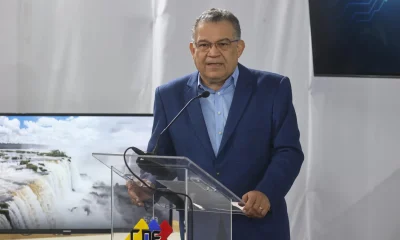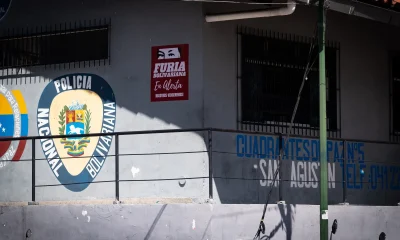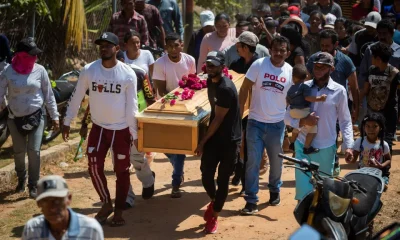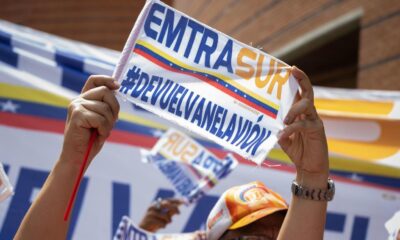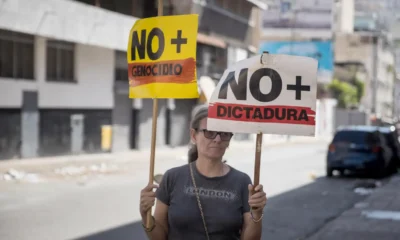International
Prosecutor’s Office reveals details of corruption scheme in Venezuela
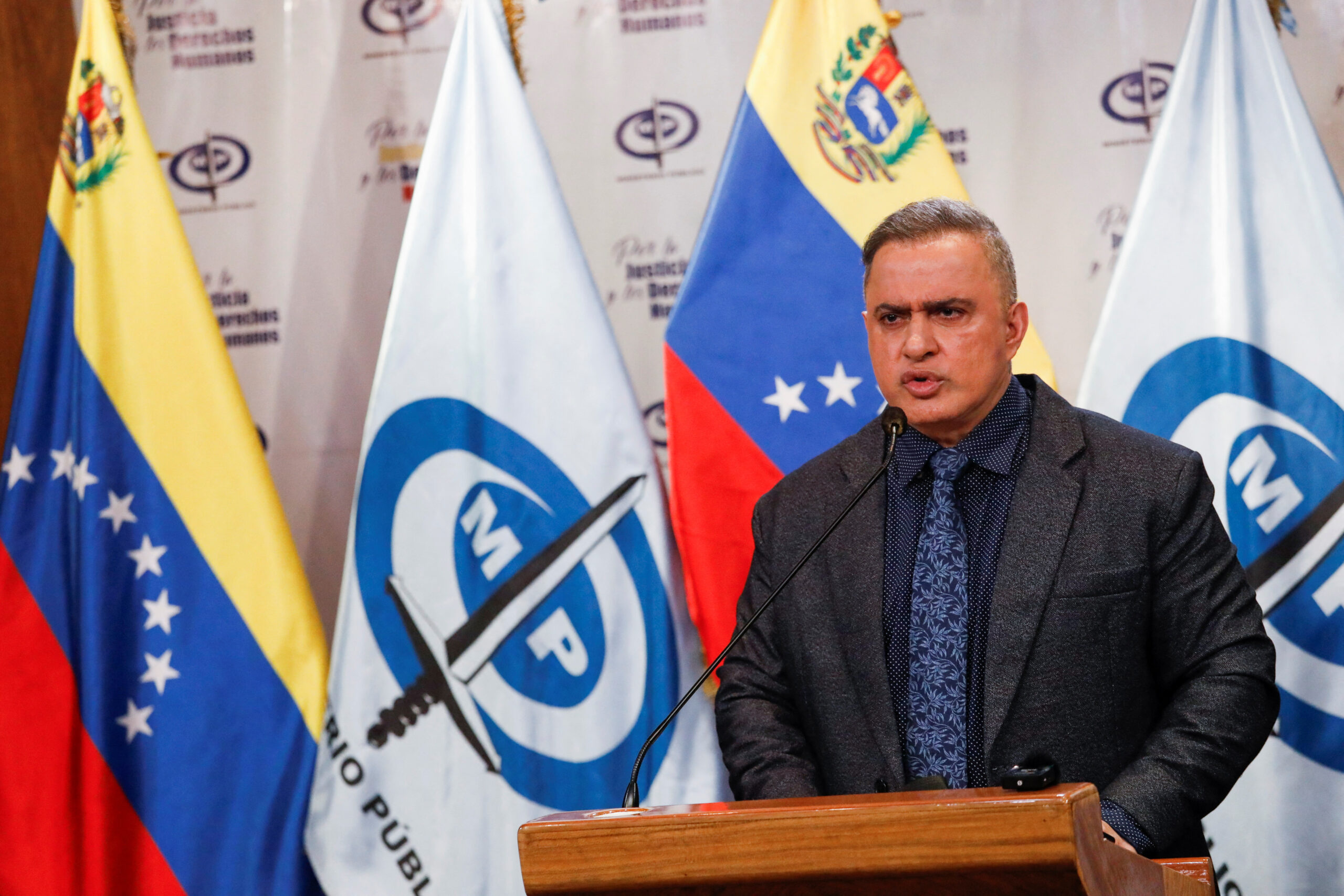
March 27 |
Venezuela’s Attorney General, Tarek William Saab, confirmed on Saturday that the corruption scheme in Petróleos de Venezuela (PDVSA) involved the National Superintendence of Crypto-assets (Sunacrip) and implied “parallel operations” with crude oil cargoes in ships, without “any type” of administrative control or guarantees, “failing to comply with the contracting regulations”.
“Once the legally assigned crude was commercialized, the corresponding payments to PDVSA were not made, that is where we are seeing the patrimonial damage, the party that makes a negotiation outside the law does not comply with the payments, we are clearly seeing the criminal modality that they used”, he said.
Saab also informed that it was determined that the network used a conglomerate of mercantile companies to legitimize the capital obtained from the sales, through the acquisition of crypto-assets, movable and immovable goods, investments in the construction and real estate sector and demonstrating a “lifestyle that does not correspond to any public official”.
The prosecutor added that young people were recruited to be included in the money laundering network and that they were rewarded “with a lavish, illegal and criminal lifestyle”.
The detainees will be charged with appropriation of public assets, influence peddling, money laundering and association. The public officials will also be charged with the crime of treason.
In a press conference this Saturday, through the State channel, a video was released showing some of the arrests, warehouses where machines used for bitcoin mining were located and operations for the seizure of assets, including airplanes, buildings and fleets of vehicles.
“The assets of these subjects obtained in an illicit manner are already under safekeeping, it is an important recovery”, he insisted.
The prosecutor avoided specifying specific figures on the patrimonial damage, arguing that they are in an “investigation phase”.
Saab specified that ten officials and eleven businessmen were arrested for the corruption scheme.
The officials are: Antonio José Pérez Suárez, vice-president of Commerce and Supply of PDVSA and whom he pointed out as “main boss” of the corruption structure; Joselit Ramírez Camacho, now former superintendent of Sunacrip, who appears in a list of the US Department of Homeland Security of wanted for “money laundering and evasion of sanctions”.
In addition, the now former congressman Hugbel Roa, who, according to the prosecutor, used his position as congressman of the National Assembly to manage the assignment of crude oil loading contracts to operators who then did not pay, and who he described as “one of the most brazen of the criminal gang”.
José Agustín Ramos, Yamil Alejandro Martínez, Oduardo José Bordones, Heinrich Chapellín Biundo and Jesús Enrique Salazar, officials of PDVSA’s vice-presidency of Commerce and Supply, with responsibility for the operations of contracting, trading, loading and transportation of crude oil abroad, detailed the prosecutor.
Rajiv Alberto Mosqueda and Reny Gerardo Barrientos, both officials of the Intendencia de Minería Digital, were also arrested.
The businessmen are Manuel Meneces, who was identified as a financial operator and advisor to the head of the structure; Roger Martínez, “coordinator of financial operations and liaison between public officials and associated businessmen”; Rafael Perdomo and Roger Perdomo, “brothers who acted as associated businessmen and national financial operators to legitimize criminals”.
In addition, Daniel Prieto, “associated businessman and financial operator at national and international level who was arrested in the Dominican Republic at the request of the Venezuelan State.
He also mentioned Cristopher Barrios, Joana Torres, Alejandro Arroyo, Bernando Arosio, Fernando Bermudez and Leonardo Torres.
“All of them linked to this corruption network, with the same modality, laundering money, legitimizing capitals, they were assigned millionaire contracts that they almost never fulfilled, even since Hugbel Roa was Minister of Food”, specified Saab.
Saab announced that arrest warrants were released for eleven more persons: Juan Manuel Afonso and Manuel Ramón Afonso, “brothers as associated businessmen and international financial operators to legitimize illegally obtained capitals”; William Ribas, Ximena Parada, Eduardo Noriega, José Luis Ferrandiz, Olvanis Gaspari, Railyn Elizabeth Yépez, Rodolfo Moleiro, Alejandro Londoño and Yurabic Ravelo, regarding the latter he did not specify how they are involved.
“Several of these ladies who appear as captors to legitimize capital for these subjects appear to be linked,” he added.
The prosecutor made special mention to Pedro Hernández, mayor of the Santos Michelena municipality in Aragua state in the center of the country, arrested for his links with “El Conejo”, one of the most wanted criminals in Venezuela and who was killed this week, as confirmed on Friday by the Minister of the Interior, Remigio Ceballo.
“This mayor financed and supported with State resources parties, public events and logistic material of criminal groups, among them this guy’s (…) the maximum penalty will be applied to this group of people”, he assured.
Regarding the mayor, Saab accused him of having direct links with the criminal Héctor Guerrero, alias “el niño Guerrero”, who leads “terrorist cells at international level” in countries such as Colombia, Ecuador, Peru and Chile.
The mayor was charged with the crimes of aggravated extortion, terrorism, obstruction of the freedom of commerce, aggravated criminal association, money laundering and treason.
The prosecutor reiterated that attorney Cristóbal Cornieles Perret, president of the Criminal Judicial Circuit of Caracas and José Mascimino Márquez, fourth judge of Control with competence in cases related to terrorism crimes, were arrested for having dropped charges and granted a substitutive measure to Cheremo Carrasquel, a man prosecuted as a member of the Ten del Llano, an organized crime group.
He also confirmed that, in Falcón State, attorney Bracho Gómez was arrested for having agreed to deliver motor vehicles that were subject to a precautionary seizure measure.
Regarding members of the former interim government, Saab reminded that they have opened approximately 22 investigations for crimes of usurpation of functions, capital legitimization, terrorism, corruption and treason, among others.
“We have achieved 288 arrest warrants, 129 people have been arrested and charged, here there has been no impunity against this sector called interim government, there are 13 people with extradition request, 63 people have been sentenced and 137 raids and 149 seizures have been made. There is an important result”, he stated.
According to Saab, since August 2017 the MP has investigated 31 plots linked to the fight against corruption, particularly to the oil industry, which has left 194 people prosecuted and tried and 75 convicted.
International
Claudia Sheinbaum: Operation Against ‘El Mencho’ Was Based on Pending Arrest Warrants

Mexico’s President Claudia Sheinbaum on Wednesday rejected claims that the military operation that resulted in the death of Nemesio Oseguera Cervantes, known as “El Mencho,” leader of the Jalisco New Generation Cartel (CJNG), was carried out under pressure from the United States government.
Sheinbaum explained that the deployment of federal forces was aimed at executing outstanding arrest warrants against Oseguera Cervantes, who was considered one of the most wanted criminals in both Mexico and the United States.
“That was not the objective (to ease pressure from the United States). It is very important, and I want to repeat it. This individual had an arrest warrant, or several,” Sheinbaum said, referring to the operation conducted on February 22.
According to the president, the initial goal was to capture Oseguera Cervantes, but military forces responded after coming under attack during the intervention.
“The operation was to detain him. The problem is that they were attacked — the Secretariat of National Defense — and they responded at that moment,” she said.
The president insisted that the action was not carried out in response to external demands, although she acknowledged intelligence cooperation with the United States.
“It was not done in any way because of pressure from the United States, not at all. Of course, there was intelligence information from the United States that was used specifically,” she concluded.
International
Spain Denies Any Agreement to Cooperate with U.S. Military in Iran Operations
International
White House Says Spain Agrees to Cooperate with U.S. Military After Trump Threatens Trade Embargo

White House Press Secretary Karoline Leavitt said Wednesday that Spain has agreed “in recent hours” to cooperate with the U.S. military, following President Donald Trump’s threat to impose a trade embargo on Madrid.
Trump had warned of potential commercial measures after Spain reportedly refused to allow the Pentagon to use facilities at Spanish military bases for operations related to Iran.
“With respect to Spain, I think you heard the president’s message yesterday loud and clear, and I understand that in recent hours they have agreed to cooperate with the United States military,” Leavitt said during a press briefing.
She added that the U.S. military is currently coordinating with its counterparts in Spain. However, the president expects broader support.
“The president expects that all of Europe, all of our European allies, of course, will cooperate in this important mission — not only for the United States, but also for Europe,” Leavitt said.
Her remarks came in response to questions about Spain’s position and its role as a U.S. ally amid rising tensions surrounding operations involving Iran.
-

 International4 days ago
International4 days agoIran Reports 201 Dead, 747 Injured After U.S. and Israeli Strikes
-

 International2 days ago
International2 days agoBrazil’s Supreme Court Rejects Bolsonaro’s Bid for House Arrest
-

 International4 days ago
International4 days agoPope Leo XIV Urges End to ‘Spiral of Violence’ in Middle East
-

 International4 days ago
International4 days agoSecurity Council to Hold Emergency Meeting on Middle East Crisis
-

 Sin categoría4 days ago
Sin categoría4 days agoTrump: ‘We Think It’s True’ Amid Claims Iran’s Supreme Leader Was Killed
-

 International2 days ago
International2 days agoAnti-ICE Billboard Campaign Targets Immigration Spending in 31 U.S. Cities
-

 International1 day ago
International1 day agoSpain’s Prime Minister to Address Nation Amid Trump’s Trade Threats
-

 International2 days ago
International2 days agoTrump Warns of ‘Major Wave’ of Attacks as Iran Conflict Escalates
-

 International2 days ago
International2 days agoMexico Calls for Immediate Probe After National Dies in ICE Custody
-

 International2 days ago
International2 days agoBolivia Orders Three Investigations Into Deadly Military Plane Crash
-

 International1 day ago
International1 day agoNew York Announces First 2,000 Seats in Universal 2-K Program
-

 Central America2 days ago
Central America2 days agoPanama Canal Monitoring Trade as Middle East Conflict Disrupts Shipping
-

 International9 hours ago
International9 hours agoWhite House Says Spain Agrees to Cooperate with U.S. Military After Trump Threatens Trade Embargo
-

 International9 hours ago
International9 hours agoSpain Denies Any Agreement to Cooperate with U.S. Military in Iran Operations
-

 Central America1 day ago
Central America1 day agoGuatemala’s Attorney General Fails in Bid for Top Court Seat Amid Corruption Allegations
-

 International1 day ago
International1 day agoWarner Bros. Developing First ‘Game of Thrones’ Movie With ‘Andor’ Writer
-

 Central America9 hours ago
Central America9 hours agoNicaragua Held Responsible for Harassment of Opposition Prosecutor and His Family
-

 International9 hours ago
International9 hours agoClaudia Sheinbaum: Operation Against ‘El Mencho’ Was Based on Pending Arrest Warrants





























